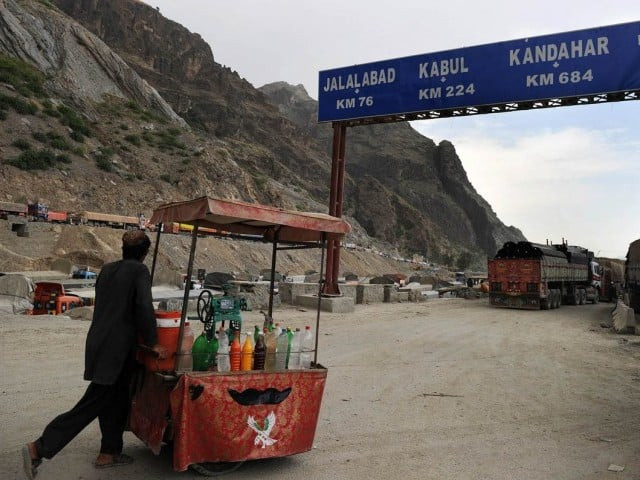Border coordination hampered amid reservations from Afghanistan
Afghan leaders view Pakistan’s proposals as attempt to legitimise Durand Line

PHOTO: AFP
The cross-border movement of militants is one of the major sticking points in Pak-Afghan relations. Both countries have repeatedly accused the other of failing to maintain strict border controls, particularly when any terrorist attack takes place on either side.
Durand, Durand
Against this backdrop of mistrust, some Afghan leaders view Pakistan’s border management proposals as an attempt to have the Durand Line recognised as an international border. Pakistan insists the Durand Line is a closed chapter. However, the Afghan government believes it remains a disputed matter.
Several countries have thrown their weight behind Pakistan’s stance on the status of the nearly 2,600 kilometre border with Afghanistan.
When Hamid Karzai rattled the border issue in his last months as president, Marc Grossman, who was then America’s special envoy for Afghanistan and Pakistan, said US considers the Durand Line an internationally-accepted boundary.
At a standstill
Pakistan and Afghanistan had been part of a trilateral border coordination system with International Security Assistance Force (ISAF) until foreign troops ended their combat mission in 2014. But both countries have failed to set up bilateral coordination centres at Torkham and Chaman.
As per Pakistani officials, they have no reservations about establishing coordination centres. The problem, they say, stems from Afghanistan.
Speaking to The Express Tribune in Kabul last week, former Afghan army chief General Sher Mohammad Karimi said, “The border stretches through rugged mountains. It is difficult [to control] but not impossible.”
He added, “It is [only] possible when both [countries] join hands and there is a mutual understanding. We should not make excuses.” According to Karimi, border forces in Pakistan should control their side of the boundary, stop the cross-border movement and help Afghan troops. “Our border force is in its formative stages,” he said. “They will need some more time to emerge as a strong force.” The former army chief said, “Both forces should share intelligence and develop a better understanding to deal with enemies.”
Bone of contention
Pakistani officials believe they have established hundreds of check posts on their side; Afghanistan has only 80.
“We are asking for an effective bilateral border coordination and efficient communication system with Afghanistan,” a government official told The Express Tribune. “We have discussed several proposals but Afghanistan’s response is discouraging.”
According to the official, a proper system will mainly benefit Afghan nationals trying to enter Pakistan. “Between 40,000 to 60,000 people cross the Pak-Afghan border every day,” the official said. “Most of them are Afghan nationals. However, the Pakistan Embassy in Kabul and its four consulates only issue around 2,000 visas daily.”
He added, “Many Afghan nationals are crossing the border on the basis of proof of registration (POR) cards and do not have any documents. Terrorists on either side take advantage [of the situation] if there is no proper deterrent.”
According to the official, Pakistan has planned to open more trade routes through Chitral and Dir. Customs and immigration systems will be put in place to boost bilateral trade.
“But the Afghan government is reluctant to agree to our proposals on the flimsy excuse that Pakistan considers [the Durand Line] an international border,” he said.
Another Pakistani official told The Express Tribune the country may opt for a series of measures on its side of the border to prevent illegal cross-border movement if Kabul is unwilling to reach an understanding.
Published in The Express Tribune, March 12th, 2016.













COMMENTS
Comments are moderated and generally will be posted if they are on-topic and not abusive.
For more information, please see our Comments FAQ